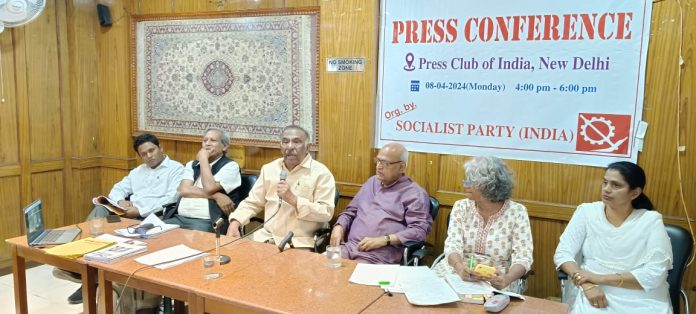– Abdul Bari Masoud
New Delhi, April 10: The Socialist Party (India) has voiced serious concerns regarding the non-implementation of the Places of Worship (Special Provisions) Act, emphasizing the importance of safeguarding religious freedom and secular principles in the country. Led by Advocate Thampan Thomas, the party asserts that any legal challenge to the status of a place of worship after the Act’s enactment is unlawful and driven by political motives, except for specific circumstances like Ayodhya.
During a press conference at the Press Club of India, Advocate Thampan Thomas highlighted the critical issue of the Act’s non-implementation, warning of its potential threat to secularism and religious freedom. The 1991 Act, enacted under the P.V. Narasimha Rao government, aims to preserve the religious character of existing places of worship as it stood on August 15, 1947, thereby upholding the secular values enshrined in the Constitution.
The Act was designed to prevent contentious issues akin to the Babri Masjid dispute and maintain the peaceful coexistence of religious communities. It prohibits the conversion of any place of worship and enforces the maintenance of their religious character. Adv. Anil Nauria, elaborating on the Act’s purpose, referenced historical resolutions emphasizing the sanctity of religious sites, dating back to Mahatma Gandhi’s era.
Despite the Act’s intent, recent controversies have surfaced, with Hindutva leaders challenging its validity in the Supreme Court. However, the Court, in its Ayodhya verdict, affirmed that the Act embodies the secular ethos of the Constitution and strictly prohibits retrogression.
The Act’s significance extends beyond legal frameworks, reflecting a constitutional commitment to heal historical injustices and uphold religious equality. It reinforces fundamental duties under Article 51A, binding both the state and citizens to preserve the religious character of public places of worship.
Addressing the media alongside Advocate Thomas were key figures, including Shashank Singh, Convenor of the Socialist Lawyers’ Forum, and Syed Tahseen Ahmad, Vice President, who echoed the urgency of upholding secular values amidst rising political rhetoric surrounding religious sites.
In the face of upcoming elections, the Socialist Party urged citizens to counter the use of religion for political gain. They highlighted critical national issues like poverty, unemployment, and inflation, accusing the Bharatiya Janata Party (BJP) of diverting attention from these pressing concerns. Allegations of financial irregularities, including the collection of electoral donations via corporate bonds, were also raised, underscoring the need for accountability in political financing.
The Socialist Party’s call to action resonates with broader efforts to uphold India’s secular fabric and protect the constitutional rights of all religious communities. As debates unfold in the judicial and political spheres, the foundational principles of the Places of Worship Act remain central to preserving the nation’s diverse religious heritage and promoting inclusive, secular governance.




